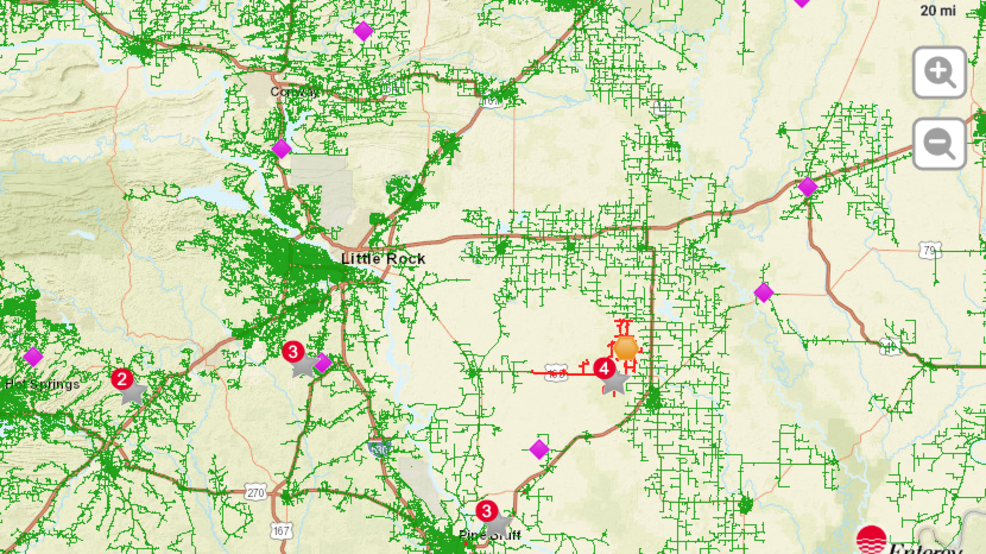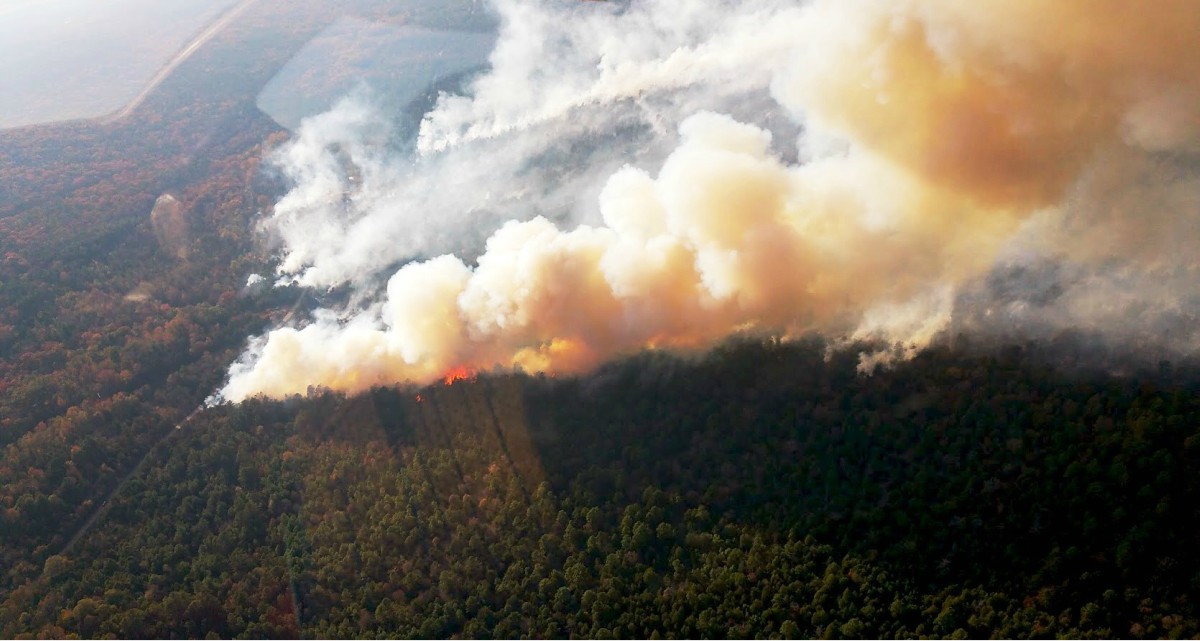Listen up, folks. If you've been following the news lately, you've probably heard about the chaos going down in Arkansas. Wildfires and power outages across Arkansas have become a real nightmare for residents. Picture this: raging fires tearing through forests, homes, and communities while power lines go dark, leaving thousands stranded without electricity. It's like Mother Nature decided to throw a curveball, and Arkansas got hit hard.
Now, let’s break it down. This isn’t just some random event; it’s a wake-up call. Climate change, human activity, and a lack of proper infrastructure are all contributing factors here. And yeah, it’s serious stuff. If we don’t pay attention, these wildfires and power outages could become the new normal. So, buckle up because we’re diving deep into this issue, exploring what’s happening, why it’s happening, and most importantly, what we can do about it.
But before we get into the nitty-gritty, let’s set the stage. Arkansas is no stranger to natural disasters, but this level of destruction? That’s unprecedented. The state is grappling with wildfires that seem unstoppable and power grids that just can’t keep up. It’s not just about inconvenience—it’s about safety, livelihoods, and the future of the region. So, let’s roll up our sleeves and figure out what’s really going on.
Read also:Morgan Kohan
Understanding the Root Cause of Wildfires in Arkansas
Alright, so what’s causing these wildfires? It’s not like Arkansas is known for being a desert or anything. The truth is, it’s a mix of factors. First off, climate change has been wreaking havoc on the weather patterns. We’re talking hotter temperatures, longer droughts, and less rainfall. That’s a recipe for disaster when it comes to wildfires. The dry vegetation? It’s basically kindling waiting to catch fire.
Human Activities: The Hidden Culprit
But wait, there’s more. Human activities are also playing a huge role here. Things like unattended campfires, discarded cigarettes, and even fireworks can spark a wildfire. And let’s not forget about land management practices. Clear-cutting forests, improper waste disposal, and lack of controlled burns can all contribute to the problem. It’s like we’re setting the stage for these fires without even realizing it.
The Impact of Wildfires on Arkansas Communities
Now, let’s talk about the impact. These wildfires aren’t just burning trees and bushes; they’re destroying homes, businesses, and entire communities. Families are being displaced, livelihoods are being ruined, and the emotional toll is immense. Imagine losing everything you’ve worked for in a matter of hours. That’s the reality for many people in Arkansas right now.
Health Risks Associated with Wildfires
And it’s not just about property damage. The smoke from these wildfires is toxic, filled with harmful particles that can wreak havoc on your respiratory system. People with pre-existing conditions like asthma or COPD are especially vulnerable. Even healthy individuals can experience symptoms like coughing, shortness of breath, and irritated eyes. It’s a health crisis on top of a natural disaster.
Power Outages: A Growing Concern
But here’s the kicker: while the wildfires are raging, the power outages are adding insult to injury. When power lines go down, it affects everything. No electricity means no air conditioning, no refrigeration, no communication, and no access to critical services. It’s like being thrown back to the dark ages, except it’s happening in 2023.
Why Are Power Outages So Common During Wildfires?
So, why does this keep happening? Well, power lines are incredibly vulnerable to wildfires. The intense heat can melt the wires, and falling trees can snap them like toothpicks. Plus, the power companies often have to shut off the power preemptively to prevent the fires from spreading further. It’s a necessary measure, but it sure doesn’t make life any easier for the residents.
Read also:Is Goregrish Illegal
Arkansas’ Response to the Crisis
Now, let’s give credit where credit is due. Arkansas isn’t sitting idly by while this crisis unfolds. Emergency services are working around the clock to contain the fires and restore power. Firefighters are risking their lives to protect communities, and utility workers are scrambling to get the power back online. It’s a massive effort, and it’s not easy.
Community Efforts and Volunteer Work
But it’s not just the professionals. Communities are coming together to support each other. People are opening their homes to those who’ve been displaced, donating supplies, and volunteering their time. It’s heartwarming to see how everyone’s pulling together in the face of adversity. That’s the true spirit of Arkansas shining through.
Preventing Future Disasters
So, what can we do to prevent this from happening again? It’s all about preparation and prevention. We need to invest in better infrastructure, implement stricter land management practices, and educate the public about fire safety. It’s not just about reacting to disasters; it’s about stopping them before they start.
Investing in Renewable Energy
One solution that’s gaining traction is renewable energy. By transitioning to solar and wind power, we can reduce our reliance on traditional power grids, which are more susceptible to wildfires. It’s a long-term investment, but it could pay off big time in the future. Plus, it’s good for the environment, which is always a win-win.
Data and Statistics: The Numbers Don’t Lie
Let’s talk numbers. According to the National Interagency Fire Center, Arkansas has experienced a significant increase in wildfires over the past decade. In 2022 alone, there were over 1,200 wildfires reported, burning more than 10,000 acres of land. That’s a staggering amount, and it’s only getting worse. As for power outages, the Arkansas Public Service Commission reports that there were over 500,000 outage events in 2022, affecting millions of residents.
Global Implications: Lessons from Arkansas
What’s happening in Arkansas isn’t just a local issue; it’s a global concern. As climate change continues to intensify, we’re likely to see more wildfires and power outages around the world. The lessons we learn from Arkansas can be applied to other regions facing similar challenges. It’s all about sharing knowledge and working together to find solutions.
International Efforts to Combat Climate Change
And let’s not forget about the global efforts to combat climate change. The Paris Agreement, the United Nations Framework Convention on Climate Change, and other international initiatives are all working towards a common goal: reducing greenhouse gas emissions and promoting sustainable development. It’s a big task, but it’s one we can’t afford to ignore.
Call to Action: What You Can Do
So, what can you do to help? First off, stay informed. Keep up with the news, follow updates from local authorities, and be prepared in case of an emergency. Second, practice fire safety. Make sure your campfires are fully extinguished, dispose of cigarettes properly, and follow all local regulations. And third, advocate for change. Write to your elected officials, support renewable energy initiatives, and spread awareness about the issue.
Conclusion: A Brighter Future for Arkansas
In conclusion, wildfires and power outages across Arkansas are serious issues that require our attention and action. By understanding the root causes, recognizing the impact, and implementing effective solutions, we can work towards a brighter future for the state and the world. So, let’s roll up our sleeves, get involved, and make a difference. Share this article, leave a comment, and let’s keep the conversation going. Together, we can create a safer, more sustainable world for everyone.
Table of Contents
- Understanding the Root Cause of Wildfires in Arkansas
- Human Activities: The Hidden Culprit
- The Impact of Wildfires on Arkansas Communities
- Health Risks Associated with Wildfires
- Power Outages: A Growing Concern
- Why Are Power Outages So Common During Wildfires?
- Arkansas’ Response to the Crisis
- Community Efforts and Volunteer Work
- Preventing Future Disasters
- Investing in Renewable Energy
- Data and Statistics: The Numbers Don’t Lie
- Global Implications: Lessons from Arkansas
- International Efforts to Combat Climate Change
- Call to Action: What You Can Do
- Conclusion: A Brighter Future for Arkansas
Thanks for sticking with me through this deep dive. Let’s keep the momentum going and make a real difference. Arkansas, we’ve got your back!


